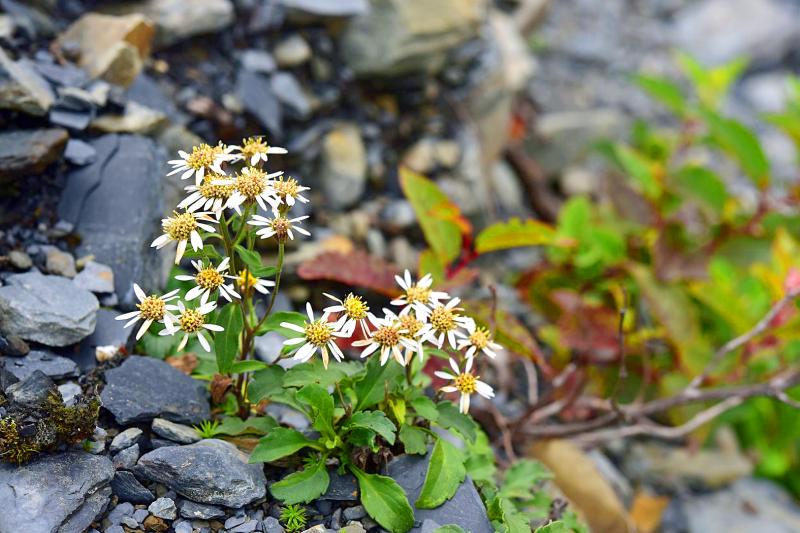Researchers have officially named a species of daisy indigenous to Taiwan nearly 100 years after it was discovered and misidentified, the Council of Agriculture’s Forestry Research Institute said on Monday.
The Aster kanoi, an endangered species, grows natively along the northern half of the central mountain range at an altitude of about 3,000m above sea level, the institute said.
Japanese naturalist Tadao Kano in the summer of 1928 discovered the plant, describing it in a 1930 publication as similar to the marguerite daisy — commonly known as the Paris daisy.

Photo provided courtesy of Chung Shih-wen
The plant was misidentified as Aster morrisonensis, which also grows along the central mountain range, but is more common, the institute said.
Several years later it was misidentified again as Aster takasagomontanus, but it was not until last year when researchers discovered the mistake and Aster kanoi became a newly recognized species of daisy, the institute said.
In August last year, a research team followed Kano’s route along the mountain range and collected samples for study.
The team last month confirmed the new species and published their findings in this month’s issue of the Taiwania.
Chung Shih-wen (鐘詩文) — one of the researchers who participated in the study — said Aster kanoi is found at Nanhushan (南湖大山) in Taichung, at the central range peak near the border between Taichung and Hualien County, and along cliff faces at the edge of the forest in Taroko National Park.
In the past, it was often mistaken for Aster takasagomontanus, but that species grows at a higher altitude, he said.
Because Aster kanoi grows within a more confined area high in the mountains, it is vulnerable to environmental change, and should be classified as an endangered species, he added.
Researchers said they were cleaning samples at the institute and would send stems to Yilan County’s Fushan Botanical Garden, which would cultivate the plant.
Taiwan has no facilities for conserving plants grown at such high altitudes, but with the samples collected, researchers would be able to better understand the flower, Chung said.
Fushan Botanical Garden assistant researcher Lin Chien-jung (林建融) said that although Fushan is only 600m above sea level, he was able to grow high-altitude plants even without a temperature-controlled environment.
Institute director-general Chang Bin (張彬) said that although part of the institute’s job is to discover new species, of greater importance was ensuring that species do not go extinct.
The institute is in its second year of a project to collect and conserve samples of Taiwan’s indigenous plants, he said.
Artificial cultivation of species was also helping researchers better understand the plants’ unique characteristics, he added.

Temperatures in northern Taiwan are forecast to reach as high as 30°C today, as an ongoing northeasterly seasonal wind system weakens, the Central Weather Administration (CWA) said. CWA forecaster Tseng Chao-cheng (曾昭誠) said yesterday that with the seasonal wind system weakening, warmer easterly winds would boost the temperature today. Daytime temperatures in northern Taiwan and Yilan County are expected to range from 28°C to 30°C today, up about 3°C from yesterday, Tseng said. According to the CWA, temperature highs in central and southern Taiwan could stay stable. However, the weather is expected to turn cooler starting tonight as the northeasterly wind system strengthens again

The Ministry of Foreign Affairs (MOFA) yesterday expressed “grave concerns” after Singaporean Prime Minister Lawrence Wong (黃循財) reiterated the city-state’s opposition to “Taiwanese independence” during a meeting with Chinese Premier Li Qiang (李強). In Singapore on Saturday, Wong and Li discussed cross-strait developments, the Singaporean Ministry of Foreign Affairs said in a statement. “Prime Minister Wong reiterated that Singapore has a clear and consistent ‘one China’ policy and is opposed to Taiwan independence,” it said. MOFA responded that it is an objective fact and a common understanding shared by many that the Republic of China (ROC) is an independent, sovereign nation, with world-leading

COOLING OFF: Temperatures are expected to fall to lows of about 20°C on Sunday and possibly 18°C to 19°C next week, following a wave of northeasterly winds on Friday The Central Weather Administration (CWA) on Sunday forecast more rain and cooler temperatures for northern Taiwan this week, with the mercury dropping to lows of 18°C, as another wave of northeasterly winds sweeps across the country. The current northeasterly winds would continue to affect Taiwan through today, with precipitation peaking today, bringing increased rainfall to windward areas, CWA forecaster Liu Pei-teng (劉沛滕) said. The weather system would weaken slightly tomorrow before another, stronger wave arrives on Friday, lasting into next week, Liu said. From yesterday to today, northern Taiwan can expect cool, wet weather, with lows of 22°C to 23°C in most areas,

DEFENDING FREEDOM: Taiwanese love peace and helping others, and hope to be a positive force in the world, Vice President Hsiao Bi-khim told ‘Weltspiegel’ Taiwan is making every effort to prevent war in the face of China’s hybrid coercion tactics and military threats, Vice President Hsiao Bi-khim (蕭美琴) said in an interview with German public broadcaster ARD’s program Weltspiegel that aired on Monday. Taiwan is not seeking provocation or intending to disrupt international order, but “must possess the capacity for self-defense,” a news release issued by the Presidential Office yesterday quoted her as saying. Taiwan is closely watching not only the increasing scope and frequency of Chinese military exercises around the nation, but also Beijing’s hybrid and cognitive warfare tactics, including manipulating public opinion, fostering